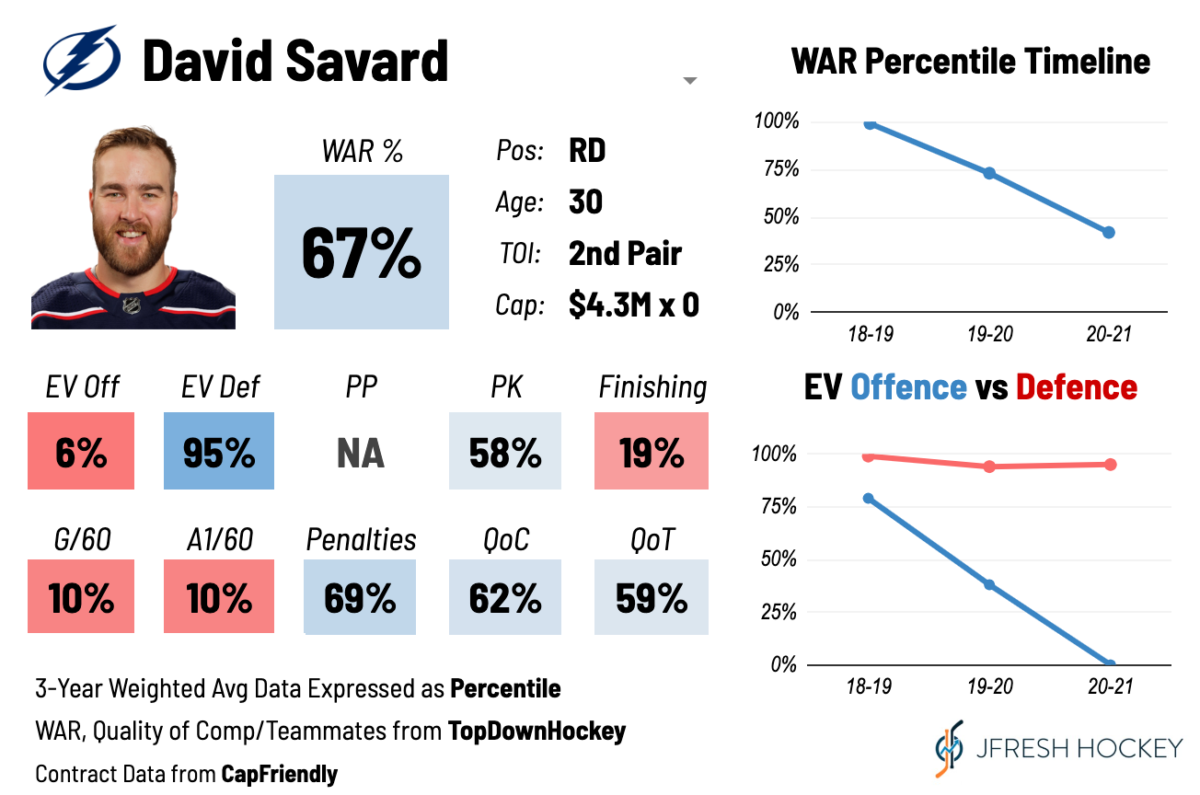The Montreal Canadiens found themselves in a tough situation when free agency opened on Wednesday. Veteran centerman Phillip Danault was reportedly looking to sign elsewhere (he signed a six-year deal with the Los Angeles Kings), which wasn’t a surprise considering he had turned down an extension from the Canadiens at the beginning of last season.
This was just the tip of the iceberg.
Tomas Tatar is also expected to leave Montreal as Brendan Gallagher has no choice but to find new linemates for the 2021-2022 season. And there’s the sad news that captain Shea Weber will not be returning to lead the club next season, due to several lingering injuries (from “Canadiens have changed significantly, and Brendan Gallagher is eager to find out how they handle it,” The Athletic, 7/29/2021).
But the tiny silver lining to all of this is that general manager Marc Bergevin managed to sign some new names through free agency, including the coveted David Savard—a veteran defenseman who hoisted the Stanley Cup with the Tampa Bay Lightning this past season. He has the potential to play a major leadership role on a fairly young Canadiens club.
What Savard Brings to Montreal
By adding Savard, Bergevin has attempted to alleviate Weber’s absence from the roster. The 94th overall pick by the Columbus Blue Jackets in the 2009 Entry Draft was not a bad choice, but Savard isn’t going to bring everything Weber brought to the club.
That’s not to say Savard doesn’t have a lot to offer the Canadiens, but his lacklustre play in certain areas is cause for concern. He didn’t perform very well in his short stint with the Lightning last season, registering no points and a minus-8 rating in 14 games. Before he was traded to Tampa Bay, Savard potting just a single goal and five assists in 40 games with the Blue Jackets and a minus-19 rating.

However, offensive production doesn’t tell the whole story, which is certainly the case with Savard. He is respected as a shut-down defenseman with little offensive upside. When he’s on the ice, his defensive play is second to none. Though his penalty killing could be better, he is a reliable body on special teams, which was one of the Canadiens’ great strengths during their Stanley Cup run.
While Savard’s projected wins above replacement (WAR) is above average, he is trending down, which makes this acquisition questionable. Maybe he just needs a change of scenery, but he’ll have to pick up his game if he is to make an impact in Montreal.
However, considering Savard’s physical play, it’s surprising that he doesn’t take more penalties. There’s nothing worse than having one of your best penalty killers in the penalty box, and Savard plays with discipline that the Canadiens’ coaching staff can rely on against some of the biggest talents in the league. This is where he can share some of the responsibilities that were given to Weber.
Savard has averaged around 19 minutes of ice time (TOI) in the past few seasons, but I expect head coach Dominique Ducharme will increase that time to around 22 or 23 minutes—the same amount of time Weber had played the last few seasons.
Another positive is his cap hit. He will be paid $3.5 million per year for the next four years, which isn’t bad for a player of his calibre. Some have expressed their discontent on social media with the term of his contract but I’m okay with it. If he can play a shutdown role for the next four years, it will be worth it.
Final Thoughts
Savard will not be able to replace Weber’s massive role on the team, but he has the potential to play a leadership role amongst a young group of players and take on a lot of defensive responsibility.
Though he is a pure defenseman—and that’s where he’s comfortable—I’d like to see the Canadiens staff work with him in developing his offensive game. The Atlantic Division will be among the best divisions in the league, and it will take the effort of all five players on the ice for the club to be successful in 2021-22.